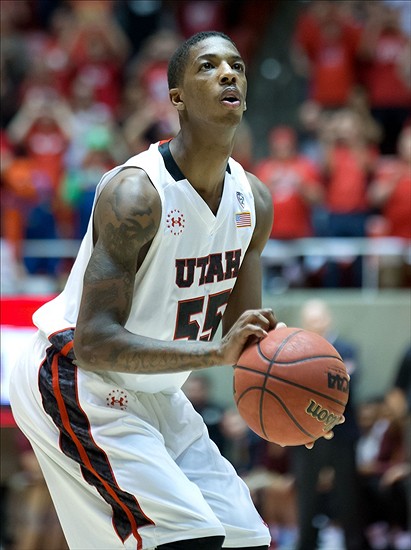Preseason Questions: Is Utah’s Delon Wright Ready For Stardom?
Posted by Bennet Hayes on November 7th, 2014Many college basketball fans still may not know who Delon Wright is – he remains a trendy selection for the “criminally underrated” superlative – but 12 months ago, no college basketball fan knew who Delon Wright was. The younger brother of NBA veteran Dorell Wright was a late bloomer who garnered little recruiting attention out of high school. He was a more coveted quantity by the time his two years at the City College of San Francisco had expired, but even then, Wright arrived on Utah’s campus with little fanfare.

Delon Wright Was A Pleasant Surprise Last Year; Are Bigger Things In Store For The Utah Senior This Season?
What a difference a year can make. The efficiency tour de force that was Wright’s first D-I season has turned him into a preseason contender for Pac-12 Player of the Year and made his team a good bet to crash its first NCAA Tournament in a half-decade. Utah was picked second in the Pac-12 preseason poll, and for the first time in a long time, there are real expectations in Salt Lake City. Whether those hopes are fulfilled will partially be decided by how stirring an encore (and finale) Wright can deliver. The now-senior was brilliant last season, but also disappeared for critical stretches of a Utah season that ended in the NIT. Fans crave a different sort of postseason this year, but a critical question has yet to be answered: Is Delon Wright ready for stardom?
Statistically speaking, Wright kept everyone happy last year. Old school per-game enthusiasts were satiated by a nightly average of 15.5 PPG/6.8 RPG/5.8 APG across the board, while efficiency hounds marveled at Wright’s disruptive defensive habits (4.0% steal percentage, 3.5% block percentage) and a squeaky clean 119.2 offensive rating. His efficient offense was propelled by an eye-popping 62 percent two-point field goal percentage, an outrageous rate of conversion for a guard from inside the arc. By contrast, Louisville’s preseason All-America big man Montrezl Harrell had 97 dunks a season ago and still failed to match Wright’s gaudy two-point range percentage.
Herein lies the rub. With his long arms and smooth athleticism, Wright is an undeniably efficient finisher around the rim, but reproducing that conversion rate looms as an impossible challenge. Even ignoring the fact that Wright’s usage rate is likely to rise this season, it’s fair to expect significant reversion to the mean. A small efficiency adjustment in one area is no cause for disaster, but Wright’s limited perimeter game will magnify any drop-off inside the arc. He made only 12 three-pointers a season ago, shooting a chilly 23 percent from long distance. The issue is not genetic – older brother Dorell is a career 36 percent three-point shooter in the NBA – but it’s a glaring weak spot within a diverse skill set. Any improvement to his jump shot would do well to round out Wright’s offensive game, but assuming significant offseason improvement is presumptuous. On paper, Wright appears very unlikely to maintain his offensive efficiency levels of last season. The beauty of Wright’s game is that he doesn’t need to score to deliver tremendous impact. He is a willing and legitimate distributor (90th best assist rate in the country last year), rebounds as well as any guard around, and spearheads a stout defensive unit with a ball-hawking mentality that comes at no expense to solid one-on-one defense. These are constants – and valuable ones. But are they enough to call Wright a star?
For a Utah team that suffered eight of its 12 losses by four points or fewer a season ago, the answer may be no. Late-game offense often bogged down due to the Utes’ dependency on Wright and Jordan Loveridge; hoping to avoid a similar fate this year, Larry Krystkowiak would be thrilled to see one of his two stars emerge as a true takeover scorer. Diversifying the offense with other players wouldn’t hurt either, but nobody in Salt Lake would mind if Wright emerged as the go-to guy. Let’s be clear: Wright becoming a star is not a necessary condition for Utah to break its NCAA Tournament dry spell. The Utes return every meaningful contributor from a season ago, add highly touted freshmen Brekkott Chapman, and will do battle in a WIDE-open Pac 12. Still though, Wright’s contributions to this team are undeniably important, and he should prove to be a good barometer for its ultimate success or failure. Fast forward to January and February: If college basketball fans know Delon Wright’s name by then, late March will be far more likely to become reacquainted with the Utes.











































